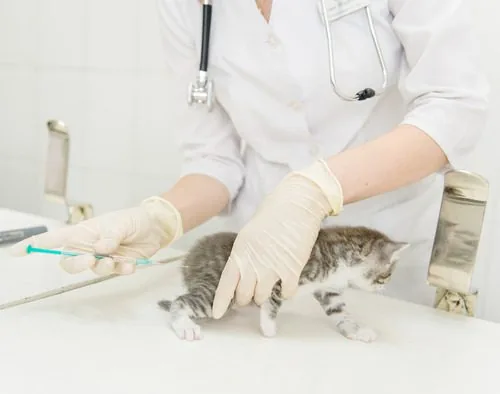National Heartworm Awareness Month: Heartworm prevention for your dog in Wilton, NY
 Did you know that April is National Heartworm Awareness Month? We are excited for the opportunity to bring more attention to this dangerous but easily preventable disease, which currently affects more than one million pets in the United States. Heartworm disease is transmitted by mosquitos, and infected pets can suffer damage to their blood vessels, lungs and heart. Adult heartworms can grow up to a foot long in the body, and severe infections can result in heart failure or even death. Luckily, there are two simple yet critical steps you can take to protect your beloved pet from this disease: give them monthly heartworm prevention, and make sure they get their yearly heartworm test
Did you know that April is National Heartworm Awareness Month? We are excited for the opportunity to bring more attention to this dangerous but easily preventable disease, which currently affects more than one million pets in the United States. Heartworm disease is transmitted by mosquitos, and infected pets can suffer damage to their blood vessels, lungs and heart. Adult heartworms can grow up to a foot long in the body, and severe infections can result in heart failure or even death. Luckily, there are two simple yet critical steps you can take to protect your beloved pet from this disease: give them monthly heartworm prevention, and make sure they get their yearly heartworm test
You may be wondering why, even with our frigid winters, we recommend giving heartworm prevention year-round. Heartworm disease has been diagnosed in all 50 states, and is spreading to new regions of the country every year. Furthermore, the risk factors for contracting heart disease are almost impossible to predict. Numerous variables cause rates of infection to vary from year to year, including changes in climate and the population of wildlife carriers. Your dog’s heartworm preventive works by eliminating heartworm larvae before they can grow into dangerous adult worms. It only takes one bite from an infected mosquito to put your dog at risk, whether they are an indoor or outdoor pet. This is why both the American Heartworm Society and the Companion Animal Parasitic Council recommend year-round heartworm prevention for all dogs, regardless of where they live.
If you are giving your dog a monthly heartworm preventive, that’s fantastic! But you may be curious why they still need a heartworm test every year. The fact is, an annual heartworm test for your dog is one of the best things you can do as a responsible pet owner. Even with the best intentions, we all have months where life gets in the way. We may inadvertently skip a dose or two of heartworm prevention, or give it too late for it to be effective. These small lapses in treatment create an opportunity for your dog to contract heartworm disease. Even worse, if heartworm preventive is unknowingly given to a dog with an active heartworm infection, it can cause a life-threatening anaphylactic reaction. It’s still a good idea to test your dog even if you’re certain they have received consistent monthly prevention, because it will ensure the prevention is working properly. The test just requires a small blood sample that can be obtained in a routine office visit, and results are generally available within 24 hours.
Your cat can get heartworm disease, too, and luckily, we do have testing and prevention available for our feline friends! They are not as easily infected as dogs, but it only takes one or two adult heartworms to make a cat very sick. There are few, if any, early signs of heartworm infection in dogs and cats. Additionally, the earlier a heartworm infection is diagnosed, the better chance of recovery for that pet. This is why when it comes to heartworm disease, prevention and early detection are key!
In the spirit of Heartworm Awareness Month, we would like to highlight a recent case of heartworm disease that was treated here at SVH. Jack is a two-year-old Pitbull mix who was adopted by Tracey and Edward L. in February 2021. He had been doing very well at home, and seemed like a normal healthy, happy young dog. Approximately six months after his adoption, Jack came in to see Dr. Underhill for a routine heartworm screening test, which sadly revealed that he was heartworm positive. Even though Jack had been receiving his Heartgard every month, he was probably not lucky enough to have received monthly preventive prior to his adoption. Luckily, Jack’s infection was detected very early, and he had no clinical signs of advanced heartworm disease that could permanently damage his heart or lungs. Jack’s family wanted the best for him, and treatment was started right away. Jack was started on an antibiotic which targets a symbiotic parasite associated with heartworms, along with a steroid to decrease inflammation. Two months later, he had his first injection to kill the adult heartworms. The treatment requires three of these injection within a 30-day period, after which Jack was required to undergo severe activity restriction for a full eight weeks. As you can see, undergoing heartworm treatment is no easy feat for the pet or owner, but Jack was very fortunate to have such a dedicated family who was up to the task. Jack will have his recheck heartworm test this November, at which point we’ll hopefully find out that he’s negative. Jack was such a brave boy and model patient throughout his entire treatment, and we are so thankful that we were able to detect and treat his heartworm disease in a timely manner.
Recent Posts
What Does Pet Insurance Cover?
What Does Pet Insurance Cover? As pet owners, we strive to provide the best possible care for…
Veterinary Supplements for Your Pet
Veterinary Supplements for Your Pet When it comes to the health and wellbeing of our pets, we…
Do Inside Cats Need to Be Vaccinated?
Do Inside Cats Need to Be Vaccinated? When you welcome a cat into your home, you’re not…
Benefits of Adopting a Senior Dog
Benefits of Adopting a Senior Dog Adopting a dog is a big step full of excitement and…
New Treatments for Arthritis in Pets: Librela and Solensia
New Treatments for Arthritis in Pets: Librela and Solensia Arthritis in pets is a common concern that…
About Saratoga Veterinary Hospital
Saratoga Veterinary Hospital is proud to serve as your local veterinarian of choice in WIlton, NY and the surrounding areas. Since its founding in 1973 by Dr. Sofarelli, our animal hospital’s main goal has been to strengthen the human-animal bond with exceptional veterinary medicine and client services.







